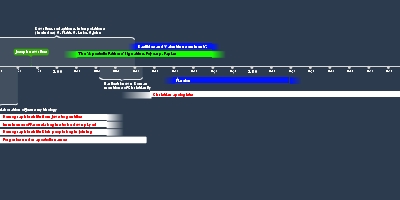Quartodeciman Controversy & Writers (1 gen 160 anni – 31 dic 221 anni)
Descrizione:
The Quartodecimian Controversy pertains to a vigorous dispute in the proto-orthodox Christian sect over what date to celebrate Easter on.Claudius Apollinaris (160-180 CE) mentions general disagreement over the day of Jesus' death, without specifically attesting controversy over the implications of the date on which Easter should be observed.
Melito of Sardis (165-175 CE) comes down on the side of celebrating Easter on the 14th of Nisan (Jewish Passover). First indication that this practice was localized to Asia Minor (Sardis).
Per Eusebius’ later report, a variety of localized meetings of bishops were held to address the Quartodeciman issue. Opposing the Quartodeciman practice (those who want to celebrate Easter on the 14th of Nisan) are:
> Theophilus of Caesarea (175-185 CE), presiding over a council including the bishops of Jerusalem (Narcissus), Tyre (Cassius), and Ptolemais (Clarus) (Theophilus also claims that Alexandria is on his side). He writes an encyclical epistle is written to this effect.
> Victor of Rome (189-199 CE) also presides over an assembly that reaches the same conclusion and writes to this effect.
> The bishops in Pontus, headed by a Palmas, agree and write
> Irenaeus concurs, representing the churches in Gaul (and possibly Osrhoëne).
> The bishop of Corinth, Bacchylus, writes a personal letter of agreement.
Polycrates of Ephesus (185-195 CE) also convenes a meeting, involving church leaders from across Asia (he may have done so at Victor's request), and all concur that the 14th of Nisan is the correct date for Easter. Polycrates writes the Roman bishop Victor to this effect, seemingly responding to a threat from Rome that the Asian churches could be cut off or declared heretical over this. As added support for his position, Polycrates cites the authority of past figures such as Polycarp, as well as apostolic succession (John and Philip).
Irenaeus asks the Roman bishop Victor I not to cut ties with Christians in Asia Minor who celebrate Easter on the Jewish Passover, claiming that in an earlier era the bishops Polycarp and Anicetus had agreed to not cause a schism over the matter.
The Didascalia (200-250 CE) comes down on the side of Asia, recommending the fast be kept on the 14th of Nisan.
Pseudo-Hippolytus (217-222 CE) brands the Quartodecimans as quarrelsome “heretics”, though he freely admits that they only differ from the proto-orthodox sect in their dating of the Easter celebration.
---
Aggiunto al nastro di tempo:
Data:
1 gen 160 anni
31 dic 221 anni
~ 62 years
